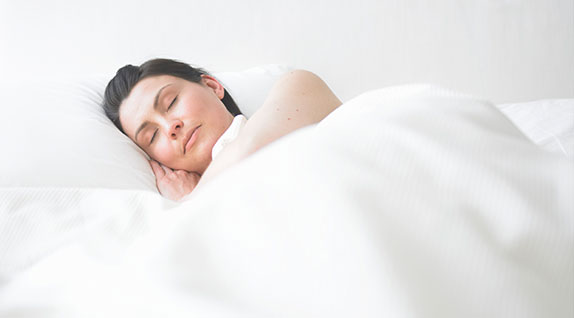 Thinkstock
Thinkstock
Article
Having sufficient sleep is vital to your overall health. What can you do to ensure you get a good night’s rest?
Learn the why behind the headlines.
Subscribe to the Real Truth for FREE news and analysis.
Subscribe NowImagine resolving to change your daily habits with the goal of achieving optimal health. You might propose exercising three to four times per week, buying more organic foods—those absent of pesticides and chemical fertilizers—and eating lean meats, whole grains, and fresh fruits and vegetables. Perhaps you would decide to drink more water and cut back on soda or sweet tea.
But what if you had made these changes yet, over the course of a month, slept only four to five hours per night? Undoubtedly, you would feel worse—not better—despite picking up healthier habits in all other areas of your life.
This points to a simple truth: getting sufficient sleep is vital to your overall health.
Consider the following from the Centers for Disease Control and Prevention: “Sleep is increasingly recognized as important to public health, with sleep insufficiency linked to motor vehicle crashes, industrial disasters, and medical and other occupational errors. Unintentionally falling asleep, nodding off while driving, and having difficulty performing daily tasks because of sleepiness all may contribute to these hazardous outcomes. Persons experiencing sleep insufficiency are also more likely to suffer from chronic diseases such as hypertension, diabetes, depression, and obesity, as well as from cancer, increased mortality, and reduced quality of life and productivity.”
Getting adequate sleep is clearly important for maintaining good health and lowering your risk of chronic disease. It is also a key to experiencing a high quality of life.
How can you ensure you get a good night’s rest?
Sleepy State
Most in the United States lack sufficient sleep. Only about 1 in 3 U.S. adults get at least seven hours—the minimum recommended by the National Institutes of Health (NIH)—according to a 2016 study by the CDC.
For teenagers, it is worse. The NIH found that less than 10 percent of American teens get at least the recommended nine hours.
Even many Americans who do receive a sufficient quantity of sleep report feeling sleep deprived. According to a 2014 report by The National Sleep Foundation, “Despite sleeping within the recommended number of hours a night, 35 percent of Americans report their sleep quality as ‘poor’ or ‘only fair.’ Twenty percent of Americans reported that they did not wake up feeling refreshed on any of the past seven days.”
Using data from the U.S. Department of Transportation, the same report concluded that “driving drowsy” is comparable to driving drunk, and is “responsible for 1,550 fatalities and 40,000 nonfatal injuries annually in the United States…”
Widespread sleep deprivation has also been connected to poor academic performance, learning and memory problems, poor physical health, and mental health conditions.
How did it get to this point?
Overstimulation
In generations before the Industrial Revolution, daily schedules were more based on the sun rather than a clock. Most rose with the sun to begin the work day, and at sunset, relaxed and retired to the relative dimness of their homes. Shortly thereafter, they went to sleep.
Today, our eyes are bombarded by artificial light, usually many hours after the sun has set.
“…we may be paying a price for basking in all that light,” Harvard Health Letter stated. “At night, light throws the body’s biological clock—the circadian rhythm—out of whack. Sleep suffers.”
When our eyes are exposed to light after the sun sets, our brains do not produce as much melatonin, the hormone responsible for drowsiness and falling asleep.
The biggest culprit is light emitted from digital screens such as smartphones, tablets, televisions and computers. These emit a type of blue light that more closely mimics the light of the sun. Harvard Health Letter stated that this light seems “to be the most disruptive at night,” signaling to our brain that it is 12 o’clock noon instead of 12 o’clock midnight. “And the proliferation of electronics with screens, as well as energy-efficient lighting, is increasing our exposure to blue wavelengths, especially after sundown.”
This affects adults as well as teenagers. Stanford School of Medicine reported: “Some 92 percent of U.S. teens have smartphones, and 24 percent report being online ‘constantly,’ according to a 2015 report by the Pew Research Center. Teens have access to multiple electronic devices they use simultaneously, often at night. Some 72 percent bring cellphones into their bedrooms and use them when they are trying to go to sleep, and 28 percent leave their phones on while sleeping, only to be awakened at night by texts, calls or emails, according to a 2011 National Sleep Foundation poll on electronic use.”
Avoiding Pitfalls
If you experience sleep inadequacy, how do you fix the problem?
There are a myriad of different physical, environmental and emotional factors that can negatively impact the quality and quantity of one’s sleep. These range from work stress, to ill-fitting beds, to sleeping conditions that are too hot or cold.
But there are simple changes you can make to positively impact the quantity and quality of your sleep.
First, related to light overstimulation, consider instituting a “digital sunset” one hour before your intended bedtime. This practice involves turning off all electronics—including televisions, tablets, smartphones and computers—long enough in advance so that your brain has time to produce enough melatonin.
If you cannot avoid using electronics at night, consider getting an application on your device that reduces the level of blue in the light. This will ensure the device does not emit the type of light that is similar to sunlight. Yet keep in mind that device usage can still prevent sustained sleep and adequate rest.
An additional point includes limiting your consumption of caffeine. Generally, 400 milligrams is considered a safe daily limit. That is roughly the amount in four cups (8 oz. cups—not giant mugs!) of brewed coffee.
Also, be cautious of the time of day you consume caffeine. On average, 75 percent of the caffeine you consume daily will be filtered out of your system within 10 hours. This means that if you consume two cups of coffee at noon, 25 percent of it—approximately 50 milligrams—will still be in your system by 10:00 p.m. (This is assuming, however, that you did not consume other caffeinated drinks—such as energy drinks or soda. Avoid these as much as possible if your goal is better sleep.)
Finally, limit alcohol consumption before bed. This may seem counterintuitive because alcohol does help a person to fall asleep. Yet “overall it is more disruptive to sleep, particularly in the second half of the night,” Irshaad Ebrahim, medical director at The London Sleep Centre in the United Kingdom, told WebMD.
He further stated, “Alcohol also suppresses breathing and can precipitate sleep apnea,” or pauses in breathing that happen throughout the night.
Remember, sleep is as important as all the other health habits you have. Follow these simple suggestions and get better sleep—tonight!
More on Related Topics:
- Afghan Hunger Crisis Deepens as Aid Funding Falls Short, UN Says
- Israel’s Longest War Is Leaving a Trail of Traumatized Soldiers, With Suicides Also on the Rise
- Maintaining Your Health as You Grow Older
- The Blind to See—Humanity’s Fight to Cure Blindness
- ‘Nightmare Bacteria’ Cases Are Increasing in the U.S.



